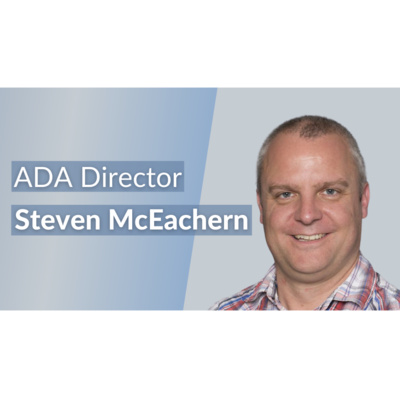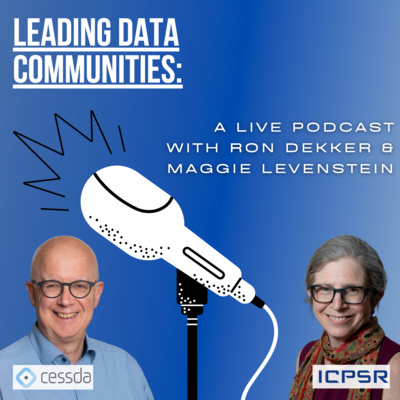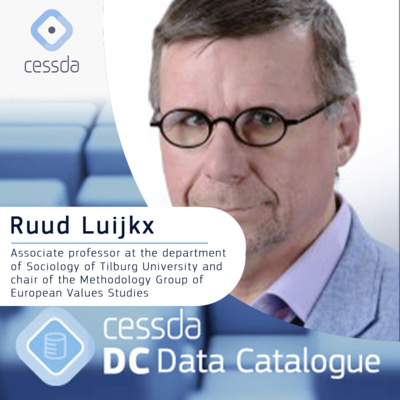
CESSDA – Stories about Data
By CESSDA

CESSDA – Stories about DataFeb 27, 2024

Interview with Emiliano Degl'Innocenti representing DARIAH-IT
Explore the entwining realms of humanities and digital humanities as we delve into the innovative initiatives of DARIAH-IT in our latest podcast episode! Join us for an enlightening conversation with Emiliano Degl'Innocenti, the National Coordinator for Italy at DARIAH-IT, where he not only leads pioneering research but also nurtures a thriving research community at the Italian National Council for Research. Engage with Emiliano as he unfolds the treasure trove of resources accessible via the CESSDA tools and services portal, positioning them as significant game-changers to augment the research capacities of the Dariah-IT Research Community. Dive deep into a discussion that highlights the pivotal role these resources play as catalysts for inventive research, magnifying the impact and breadth of humanities studies in our increasingly digital world.

Interview with Ahmad Wali Ahmad-Yar from the Hummingbird Project
In this engaging episode, Joanne interviews Ahmed Wali Ahmad-Yar, a dedicated PhD researcher affiliated with the Interface Demography Research Group at Vrije Universiteit Brussel (VUB). Ahmed also serves as a vital contributor to The Hummingbird Project, a visionary initiative supported by Horizon 2020 funding and deeply integrated into the CESSDA Data Community.
Join us as we dive into Ahmed's inspiring work, where The Hummingbird Project takes on the formidable task of comprehensively unraveling migration flows in Europe. This multifaceted endeavour harnesses both qualitative and quantitative methodologies, fostering interdisciplinary collaboration among experts spanning sociology, computer science, statistics, and demography.
In addition to his remarkable research, Ahmed underscores the invaluable resources provided by CESSDA. Notably, he emphasises the pivotal role of the European Question Bank and the CESSDA Metadata Validator in his own research endeavors.
Discover how Ahmed and the Hummingbird Project are making groundbreaking strides in understanding the complexities of migration in Europe and how CESSDA's tools can be utilised in this kind of research.

Interview with
Alìz Horváth representing OPERAS
In this episode, Joanne Ahern interviews Alìz Vorbatis, an Assistant Professor in East Asian History and Digital Humanities. Alìz's research spans East Asian cultures, focusing on China, Japan, and Korea, with a keen interest in intellectual history, cultural studies, and interdisciplinary digital approaches. Her research incorporates both archival and machine-readable annotated textual data for quantitative and qualitative analysis. Alìz finds the CESSDA Data Catalogue valuable, particularly the International Social Survey Program National Identity dataset. She also praises the CESSDA Data Management Expert Guide for its comprehensive insights, and she highlights the CESSDA Vocabulary Service and Metadata Validator as essential tools for researchers and students alike.

Interview with CESSDA Member Country Representative
Olja Toljagic (Norway)
In this podcast episode, Joanne Ahern speaks with Olja Toljagic, who represents the Research Council of Norway, serving as the Norwegian national contact point for the research infrastructure program in Horizon Europe within the EU. Olja sheds light on the vital role CESSDA plays in the European and international social sciences landscape. CESSDA not only offers extensive pan-European data services but also champions data reliability and sustainability, building trust among researchers. Tune in as we delve into the Ministry of Education and Research's plans for higher education and research in Norway and explore the future of the European Open Science Cloud (EOSC).

Interview with CESSDA Member Country Representative Matthias Reiter-Pázmándy (Austria)
Matthias represents the Austrian Ministry for Education, Science and Research, and acts as the Vice Chair of the General Assembly of CESSDA. He works in the department for Social Sciences and Humanities and focuses on creating optimal conditions for researchers in Austria, particularly regarding research infrastructures that support the whole Austrian research area. In this episode he talks to Joanne Ahern about his motivation to improve data access for social scientists.

Get to know the GoTriple platform – An innovative discovery service
GoTriple is your single access point to discover and reuse open scholarly SSH resources and find peers. How does the platform work? What can users do there? Why should researchers join? Hear from three platform experts!
GoTriple is an innovative multilingual discovery platform for the social sciences and humanities (SSH).
Search now for Resources and Users in the Social Sciences and Humanities: https://www.gotriple.eu/.

10 Questions to Steven McEachern, Director of the Australian Data Archive!
In today's interview, Steven summaries what it's like to lead the ADA community. He answers questions on data access, data management, the effects of the pandemic on his data community and more!
Visit the CESSDA website to learn more about what we do: https://www.cessda.eu/
Visit the ADA website: https://ada.edu.au/
Music by: Inspirational Corporate (Corporate Music Compilation) by Infraction
Licence: CC-BY-SA

Leading Data Communities - A Joint Podcast with ICPSR
We recently hosted a joint webinar/podcast recording with the Inter-university Consortium for Political and Social Research (ICPSR) and its director, Maggie Levenstein. Maggie talks with Ron Dekker, CESSDA director, about what it's like leading two of the world's largest data consortia through the years, and what might change for social science data in 2022 and beyond.

CESSDA Podcast with Ruud Luijkx
The CESSDA podcast series explores the important world of data archiving and sharing and our researchers across disciplines and countries are benefitting from the CESSDA Data Catalogue.
This CESSDA podcast zooms in on the role of the European Values Study in sociology, political science and civil society, with insights from Prof. Ruud Luijkx, Tilburg University and Chair of the Methodology Study. The European Values Studies is a repeated, large-scale, cross-section survey research programme yielding insights into the ideas, beliefs, attitudes, preferences, values and opinions of citizens all over Europe. Prof. Luijkx highlights evolving values in Europe since the early 1980s in what can be described as a “silent revolution” across the generations bringing implicit changes in attitudes and ideas.
The European Values Study is an ideal starting point for understanding differences between the surveyed countries at any point in time, with researchers sharing more detailed information in publications. The datasets from the combined World and European Values Studies are a joint asset in the CESSDA Data Catalogue, which gives researchers direct access to all this insightful data without having to navigate across all the archives.

CESSDA Podcast with Georg Lutz
The CESSDA podcast series explores the important world of data archiving and sharing and our researchers across disciplines and countries are benefitting from the CESSDA Data Catalogue.
This CESSDA podcast with Georg Lutz, professor of political science and Director of FORS Centre in Switzerland gives key insights into voting trends and changes in recent years and their impacts on political debate.
Linking the Swiss VOTO election surveys and data archives at the Centre with the CESSDA Data Catalogue, Prof. Lutz highlights how datasets reveal election behaviour in terms of voter drivers or lack of interest, as well as the implications for local environmental issues to climate change. He gives examples of voting behaviour variation, the demise of traditional party systems and the rise of populist politics, explaining how this is creating volatility but also barriers to tackling global challenges like climate change, which are heavily dependent on acceptance.
Finally, he highlights the value of sharing national data archives through the CESSDA Data Catalogue, which is fundamentally important not only for setting standards but showing just how valuable the data is. Through the implementation of the FAIR principles, FORS and other service providers are using the Data Catalogue to ensure accessibility and enable re-use of the data, especially unexplored data. This is extremely advantageous for the social sciences at large, as the most strongly connected discipline in Europe.

CESSDA Podcast with with Sylvia Kritzinger
The CESSDA podcast series explores the important world of data archiving and sharing and our researchers across disciplines and countries are benefitting from the CESSDA Data Catalogue.
This podcast focuses on cross-disciplinary research on the COVID-19 pandemic as the crisis evolves over time with the insights from Sylvia Kritzinger, Professor of Methods in the Social Sciences at the Department of Government of the University of Vienna. As one of the principal investigators of the Austrian National Election Study (AUTNES) and the Austrian Corona Panel Project (ACPP), Prof. Kritzinger explains the fundamental importance of the work being done to track the multi-faceted societal and economic impacts of the coronavirus, underscoring the wider benefits of sharing data, such as making recommendations for policy stakeholders, increasing awareness among citizens and enabling students to re-use the data for their own research. Overall, this demonstrates the added value of trusted repositories like CESSDA in the fascinating field of social sciences and its intersection with many other disciplines as we seek to tackle the grand challenges of our time.

CESSDA Podcast with Dr Dimitra Kondyli and Ami Saji
The CESSDA podcast series shines the spotlight on how data providers and researchers are benefitting from data curation and sharing across a broad range of topics in the social sciences and beyond.
This podcast zooms in on how the CESSDA Data Catalogue is shaping research on migration and minorities from both a data provider and user perspective with insights from Dr Dimitra Kondyli, Senior Researcher at the National Centre for Social Research in Greece and Ami Saji, junior researcher at the Centre of European and Comparative Politics at SciencePo in France. They explain how truly valuable research is enabled by CESSDA and national repositories across Europe as certified and trusted data sources. The CESSDA Data Catalogue has over 3000 datasets on migration and minorities, searchable and documented in 14 European languages with rich metadata that facilitates cross-disciplinary research all from a single access point. The Data Catalogue thus ensures that quality data is more accessible and usable by a wide range of users, academic, non-academic, policy makers, not just in Europe but all over the world.